Detailed Analysis of Relevance in Evidence Law in Australia
VerifiedAdded on 2023/06/14
|18
|5774
|467
Essay
AI Summary
This essay delves into the critical concept of relevance in evidence law, particularly within the Australian legal framework. It begins by defining evidence and its role in establishing guilt or innocence, highlighting the importance of fair trial procedures. The discussion covers the admissibility of evidence, guided by common law and statutes like the Evidence Act 1995 (Cth) and its equivalents in various Australian jurisdictions. The essay emphasizes that only relevant evidence, which has the propensity to prove or disprove lawful elements of a case or has probative value, is admissible. It distinguishes between logical relevance (rational connection to facts in issue) and legal relevance (probative value outweighing unfair bias). Key cases such as R v Wilson, R v Shamouil, and Washer v Western Australia are cited to illustrate the application of relevance tests. The essay also addresses the tribunal of fact's role in assessing evidence and the conditions under which evidence, including documents, can be deemed admissible based on its relevance and authenticity. This detailed analysis provides a comprehensive understanding of the complexities surrounding relevance in evidence law.
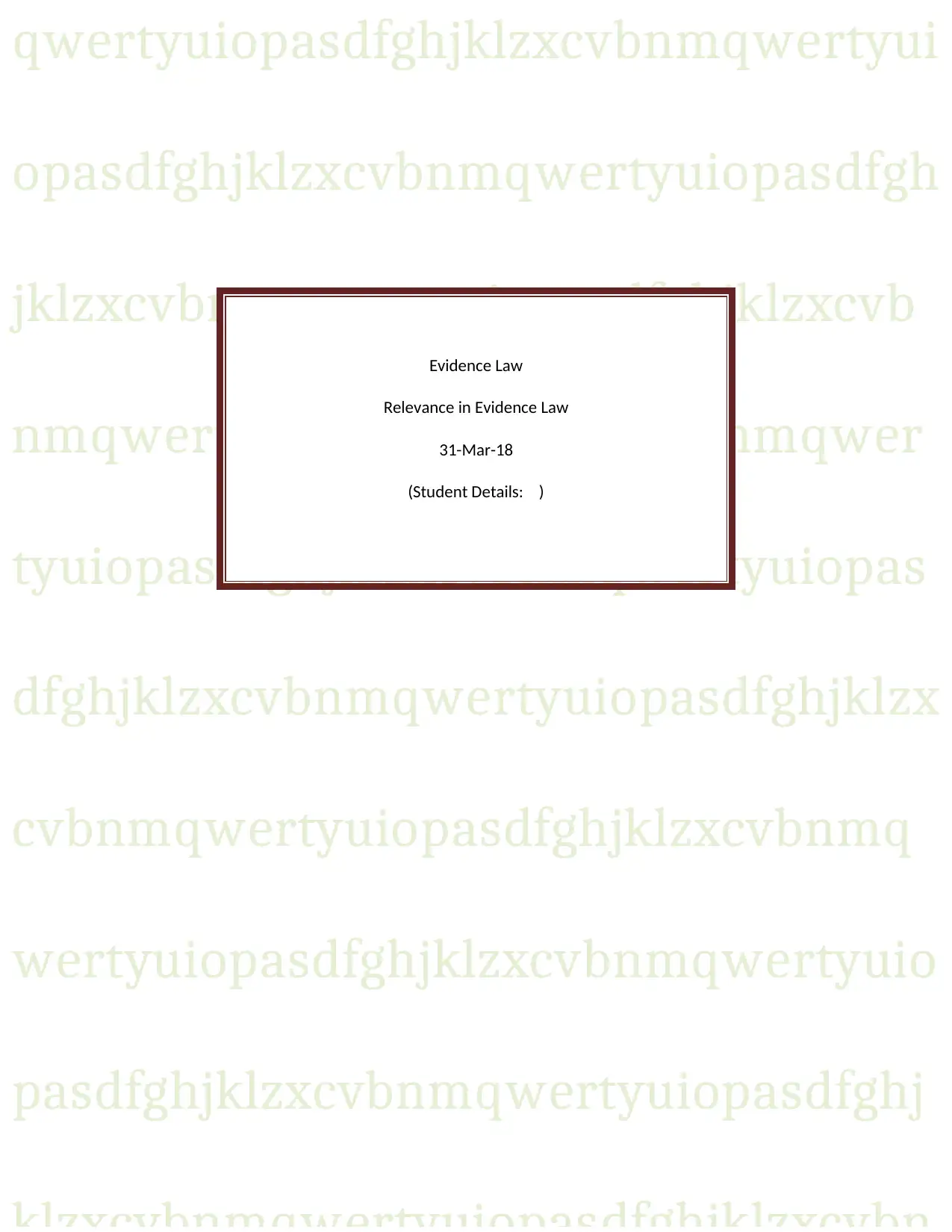
qwertyuiopasdfghjklzxcvbnmqwertyui
opasdfghjklzxcvbnmqwertyuiopasdfgh
jklzxcvbnmqwertyuiopasdfghjklzxcvb
nmqwertyuiopasdfghjklzxcvbnmqwer
tyuiopasdfghjklzxcvbnmqwertyuiopas
dfghjklzxcvbnmqwertyuiopasdfghjklzx
cvbnmqwertyuiopasdfghjklzxcvbnmq
wertyuiopasdfghjklzxcvbnmqwertyuio
pasdfghjklzxcvbnmqwertyuiopasdfghj
Evidence Law
Relevance in Evidence Law
31-Mar-18
(Student Details: )
opasdfghjklzxcvbnmqwertyuiopasdfgh
jklzxcvbnmqwertyuiopasdfghjklzxcvb
nmqwertyuiopasdfghjklzxcvbnmqwer
tyuiopasdfghjklzxcvbnmqwertyuiopas
dfghjklzxcvbnmqwertyuiopasdfghjklzx
cvbnmqwertyuiopasdfghjklzxcvbnmq
wertyuiopasdfghjklzxcvbnmqwertyuio
pasdfghjklzxcvbnmqwertyuiopasdfghj
Evidence Law
Relevance in Evidence Law
31-Mar-18
(Student Details: )
Paraphrase This Document
Need a fresh take? Get an instant paraphrase of this document with our AI Paraphraser
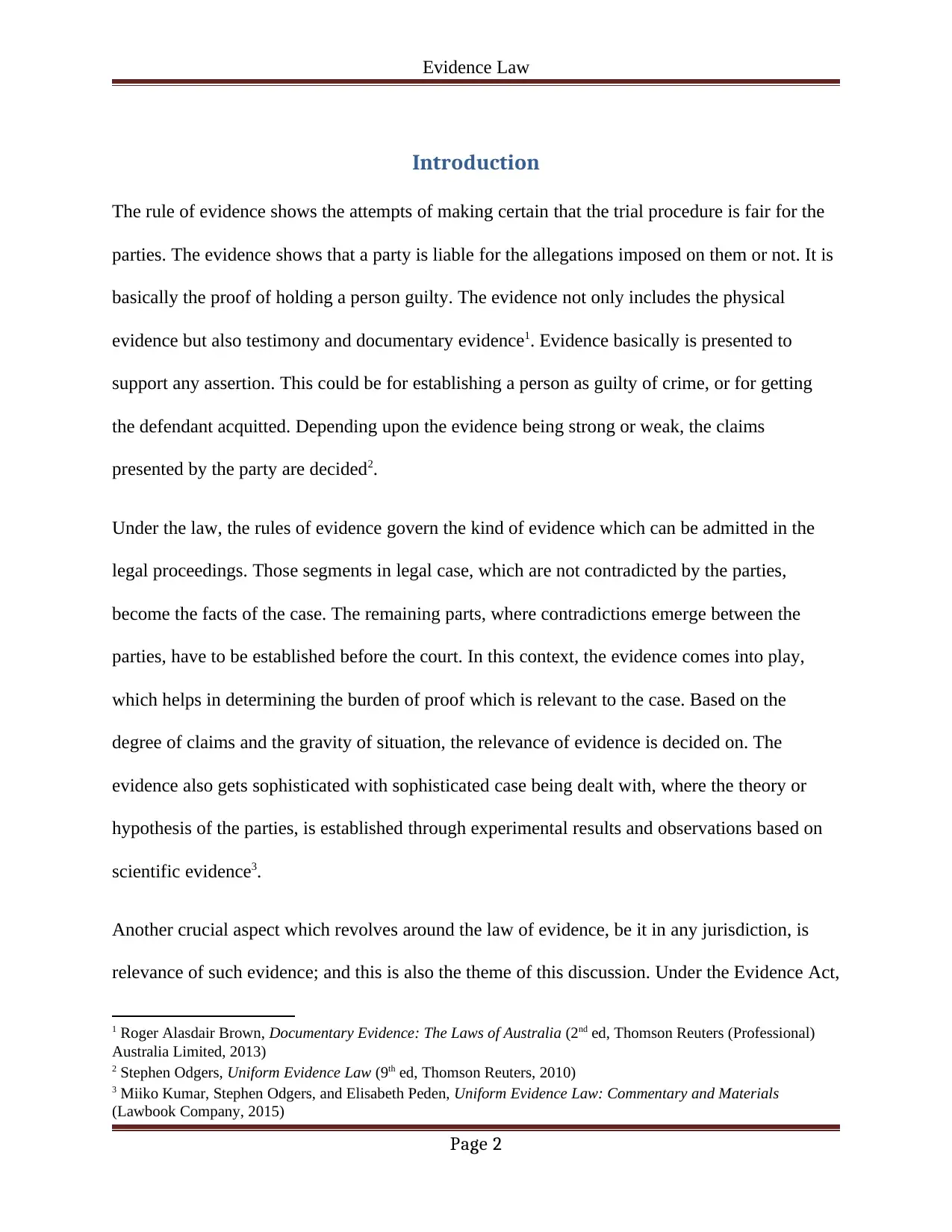
Evidence Law
Introduction
The rule of evidence shows the attempts of making certain that the trial procedure is fair for the
parties. The evidence shows that a party is liable for the allegations imposed on them or not. It is
basically the proof of holding a person guilty. The evidence not only includes the physical
evidence but also testimony and documentary evidence1. Evidence basically is presented to
support any assertion. This could be for establishing a person as guilty of crime, or for getting
the defendant acquitted. Depending upon the evidence being strong or weak, the claims
presented by the party are decided2.
Under the law, the rules of evidence govern the kind of evidence which can be admitted in the
legal proceedings. Those segments in legal case, which are not contradicted by the parties,
become the facts of the case. The remaining parts, where contradictions emerge between the
parties, have to be established before the court. In this context, the evidence comes into play,
which helps in determining the burden of proof which is relevant to the case. Based on the
degree of claims and the gravity of situation, the relevance of evidence is decided on. The
evidence also gets sophisticated with sophisticated case being dealt with, where the theory or
hypothesis of the parties, is established through experimental results and observations based on
scientific evidence3.
Another crucial aspect which revolves around the law of evidence, be it in any jurisdiction, is
relevance of such evidence; and this is also the theme of this discussion. Under the Evidence Act,
1 Roger Alasdair Brown, Documentary Evidence: The Laws of Australia (2nd ed, Thomson Reuters (Professional)
Australia Limited, 2013)
2 Stephen Odgers, Uniform Evidence Law (9th ed, Thomson Reuters, 2010)
3 Miiko Kumar, Stephen Odgers, and Elisabeth Peden, Uniform Evidence Law: Commentary and Materials
(Lawbook Company, 2015)
Page 2
Introduction
The rule of evidence shows the attempts of making certain that the trial procedure is fair for the
parties. The evidence shows that a party is liable for the allegations imposed on them or not. It is
basically the proof of holding a person guilty. The evidence not only includes the physical
evidence but also testimony and documentary evidence1. Evidence basically is presented to
support any assertion. This could be for establishing a person as guilty of crime, or for getting
the defendant acquitted. Depending upon the evidence being strong or weak, the claims
presented by the party are decided2.
Under the law, the rules of evidence govern the kind of evidence which can be admitted in the
legal proceedings. Those segments in legal case, which are not contradicted by the parties,
become the facts of the case. The remaining parts, where contradictions emerge between the
parties, have to be established before the court. In this context, the evidence comes into play,
which helps in determining the burden of proof which is relevant to the case. Based on the
degree of claims and the gravity of situation, the relevance of evidence is decided on. The
evidence also gets sophisticated with sophisticated case being dealt with, where the theory or
hypothesis of the parties, is established through experimental results and observations based on
scientific evidence3.
Another crucial aspect which revolves around the law of evidence, be it in any jurisdiction, is
relevance of such evidence; and this is also the theme of this discussion. Under the Evidence Act,
1 Roger Alasdair Brown, Documentary Evidence: The Laws of Australia (2nd ed, Thomson Reuters (Professional)
Australia Limited, 2013)
2 Stephen Odgers, Uniform Evidence Law (9th ed, Thomson Reuters, 2010)
3 Miiko Kumar, Stephen Odgers, and Elisabeth Peden, Uniform Evidence Law: Commentary and Materials
(Lawbook Company, 2015)
Page 2
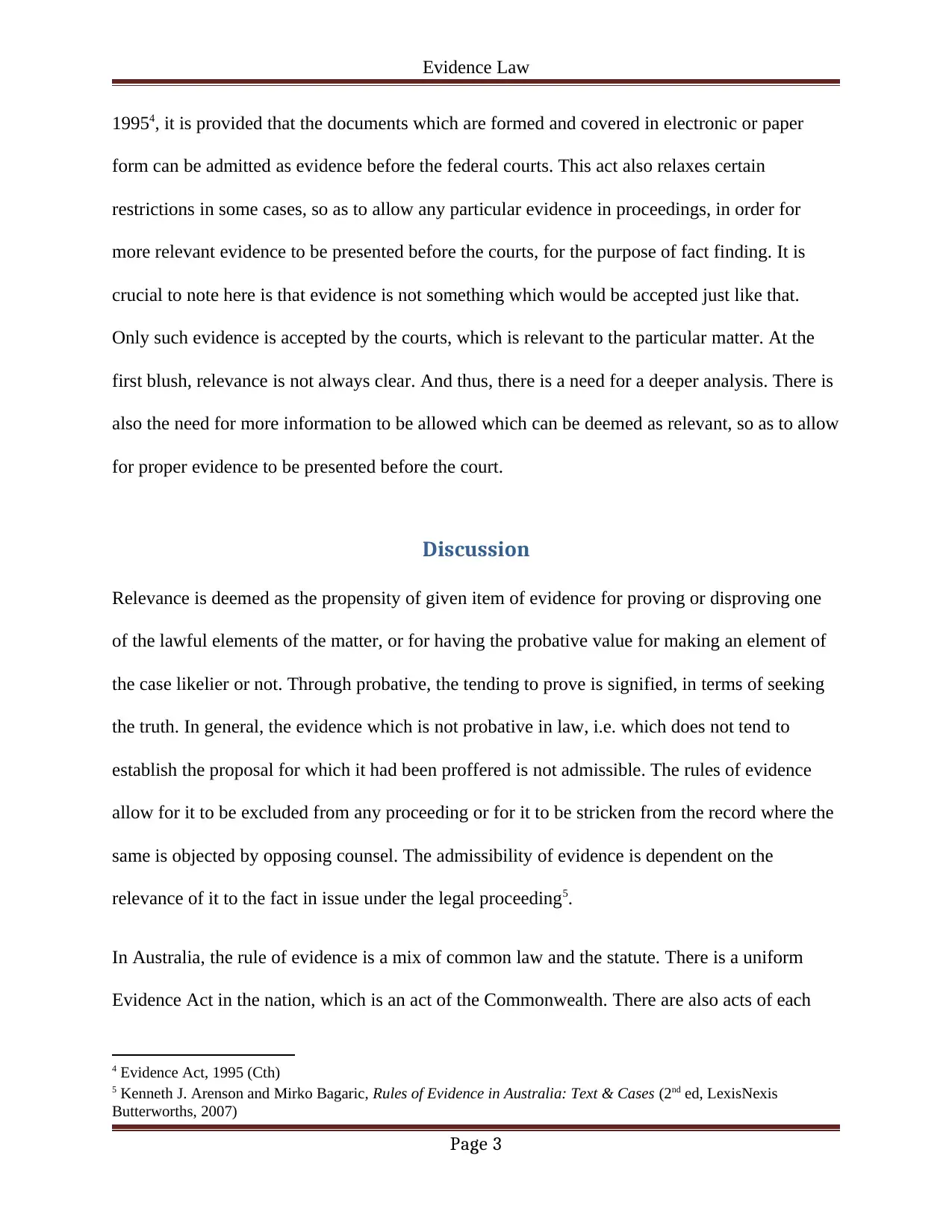
Evidence Law
19954, it is provided that the documents which are formed and covered in electronic or paper
form can be admitted as evidence before the federal courts. This act also relaxes certain
restrictions in some cases, so as to allow any particular evidence in proceedings, in order for
more relevant evidence to be presented before the courts, for the purpose of fact finding. It is
crucial to note here is that evidence is not something which would be accepted just like that.
Only such evidence is accepted by the courts, which is relevant to the particular matter. At the
first blush, relevance is not always clear. And thus, there is a need for a deeper analysis. There is
also the need for more information to be allowed which can be deemed as relevant, so as to allow
for proper evidence to be presented before the court.
Discussion
Relevance is deemed as the propensity of given item of evidence for proving or disproving one
of the lawful elements of the matter, or for having the probative value for making an element of
the case likelier or not. Through probative, the tending to prove is signified, in terms of seeking
the truth. In general, the evidence which is not probative in law, i.e. which does not tend to
establish the proposal for which it had been proffered is not admissible. The rules of evidence
allow for it to be excluded from any proceeding or for it to be stricken from the record where the
same is objected by opposing counsel. The admissibility of evidence is dependent on the
relevance of it to the fact in issue under the legal proceeding5.
In Australia, the rule of evidence is a mix of common law and the statute. There is a uniform
Evidence Act in the nation, which is an act of the Commonwealth. There are also acts of each
4 Evidence Act, 1995 (Cth)
5 Kenneth J. Arenson and Mirko Bagaric, Rules of Evidence in Australia: Text & Cases (2nd ed, LexisNexis
Butterworths, 2007)
Page 3
19954, it is provided that the documents which are formed and covered in electronic or paper
form can be admitted as evidence before the federal courts. This act also relaxes certain
restrictions in some cases, so as to allow any particular evidence in proceedings, in order for
more relevant evidence to be presented before the courts, for the purpose of fact finding. It is
crucial to note here is that evidence is not something which would be accepted just like that.
Only such evidence is accepted by the courts, which is relevant to the particular matter. At the
first blush, relevance is not always clear. And thus, there is a need for a deeper analysis. There is
also the need for more information to be allowed which can be deemed as relevant, so as to allow
for proper evidence to be presented before the court.
Discussion
Relevance is deemed as the propensity of given item of evidence for proving or disproving one
of the lawful elements of the matter, or for having the probative value for making an element of
the case likelier or not. Through probative, the tending to prove is signified, in terms of seeking
the truth. In general, the evidence which is not probative in law, i.e. which does not tend to
establish the proposal for which it had been proffered is not admissible. The rules of evidence
allow for it to be excluded from any proceeding or for it to be stricken from the record where the
same is objected by opposing counsel. The admissibility of evidence is dependent on the
relevance of it to the fact in issue under the legal proceeding5.
In Australia, the rule of evidence is a mix of common law and the statute. There is a uniform
Evidence Act in the nation, which is an act of the Commonwealth. There are also acts of each
4 Evidence Act, 1995 (Cth)
5 Kenneth J. Arenson and Mirko Bagaric, Rules of Evidence in Australia: Text & Cases (2nd ed, LexisNexis
Butterworths, 2007)
Page 3
⊘ This is a preview!⊘
Do you want full access?
Subscribe today to unlock all pages.

Trusted by 1+ million students worldwide
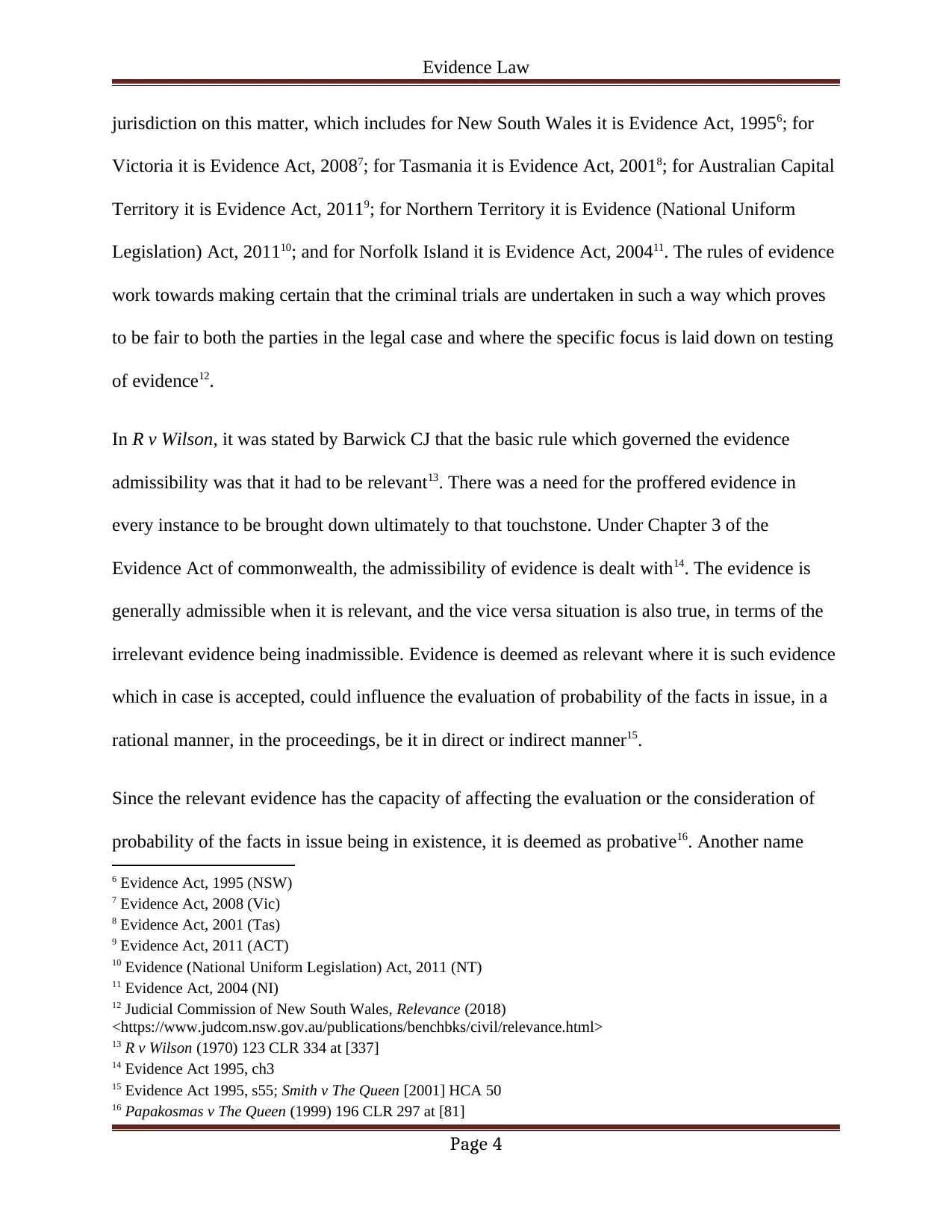
Evidence Law
jurisdiction on this matter, which includes for New South Wales it is Evidence Act, 19956; for
Victoria it is Evidence Act, 20087; for Tasmania it is Evidence Act, 20018; for Australian Capital
Territory it is Evidence Act, 20119; for Northern Territory it is Evidence (National Uniform
Legislation) Act, 201110; and for Norfolk Island it is Evidence Act, 200411. The rules of evidence
work towards making certain that the criminal trials are undertaken in such a way which proves
to be fair to both the parties in the legal case and where the specific focus is laid down on testing
of evidence12.
In R v Wilson, it was stated by Barwick CJ that the basic rule which governed the evidence
admissibility was that it had to be relevant13. There was a need for the proffered evidence in
every instance to be brought down ultimately to that touchstone. Under Chapter 3 of the
Evidence Act of commonwealth, the admissibility of evidence is dealt with14. The evidence is
generally admissible when it is relevant, and the vice versa situation is also true, in terms of the
irrelevant evidence being inadmissible. Evidence is deemed as relevant where it is such evidence
which in case is accepted, could influence the evaluation of probability of the facts in issue, in a
rational manner, in the proceedings, be it in direct or indirect manner15.
Since the relevant evidence has the capacity of affecting the evaluation or the consideration of
probability of the facts in issue being in existence, it is deemed as probative16. Another name
6 Evidence Act, 1995 (NSW)
7 Evidence Act, 2008 (Vic)
8 Evidence Act, 2001 (Tas)
9 Evidence Act, 2011 (ACT)
10 Evidence (National Uniform Legislation) Act, 2011 (NT)
11 Evidence Act, 2004 (NI)
12 Judicial Commission of New South Wales, Relevance (2018)
<https://www.judcom.nsw.gov.au/publications/benchbks/civil/relevance.html>
13 R v Wilson (1970) 123 CLR 334 at [337]
14 Evidence Act 1995, ch3
15 Evidence Act 1995, s55; Smith v The Queen [2001] HCA 50
16 Papakosmas v The Queen (1999) 196 CLR 297 at [81]
Page 4
jurisdiction on this matter, which includes for New South Wales it is Evidence Act, 19956; for
Victoria it is Evidence Act, 20087; for Tasmania it is Evidence Act, 20018; for Australian Capital
Territory it is Evidence Act, 20119; for Northern Territory it is Evidence (National Uniform
Legislation) Act, 201110; and for Norfolk Island it is Evidence Act, 200411. The rules of evidence
work towards making certain that the criminal trials are undertaken in such a way which proves
to be fair to both the parties in the legal case and where the specific focus is laid down on testing
of evidence12.
In R v Wilson, it was stated by Barwick CJ that the basic rule which governed the evidence
admissibility was that it had to be relevant13. There was a need for the proffered evidence in
every instance to be brought down ultimately to that touchstone. Under Chapter 3 of the
Evidence Act of commonwealth, the admissibility of evidence is dealt with14. The evidence is
generally admissible when it is relevant, and the vice versa situation is also true, in terms of the
irrelevant evidence being inadmissible. Evidence is deemed as relevant where it is such evidence
which in case is accepted, could influence the evaluation of probability of the facts in issue, in a
rational manner, in the proceedings, be it in direct or indirect manner15.
Since the relevant evidence has the capacity of affecting the evaluation or the consideration of
probability of the facts in issue being in existence, it is deemed as probative16. Another name
6 Evidence Act, 1995 (NSW)
7 Evidence Act, 2008 (Vic)
8 Evidence Act, 2001 (Tas)
9 Evidence Act, 2011 (ACT)
10 Evidence (National Uniform Legislation) Act, 2011 (NT)
11 Evidence Act, 2004 (NI)
12 Judicial Commission of New South Wales, Relevance (2018)
<https://www.judcom.nsw.gov.au/publications/benchbks/civil/relevance.html>
13 R v Wilson (1970) 123 CLR 334 at [337]
14 Evidence Act 1995, ch3
15 Evidence Act 1995, s55; Smith v The Queen [2001] HCA 50
16 Papakosmas v The Queen (1999) 196 CLR 297 at [81]
Page 4
Paraphrase This Document
Need a fresh take? Get an instant paraphrase of this document with our AI Paraphraser
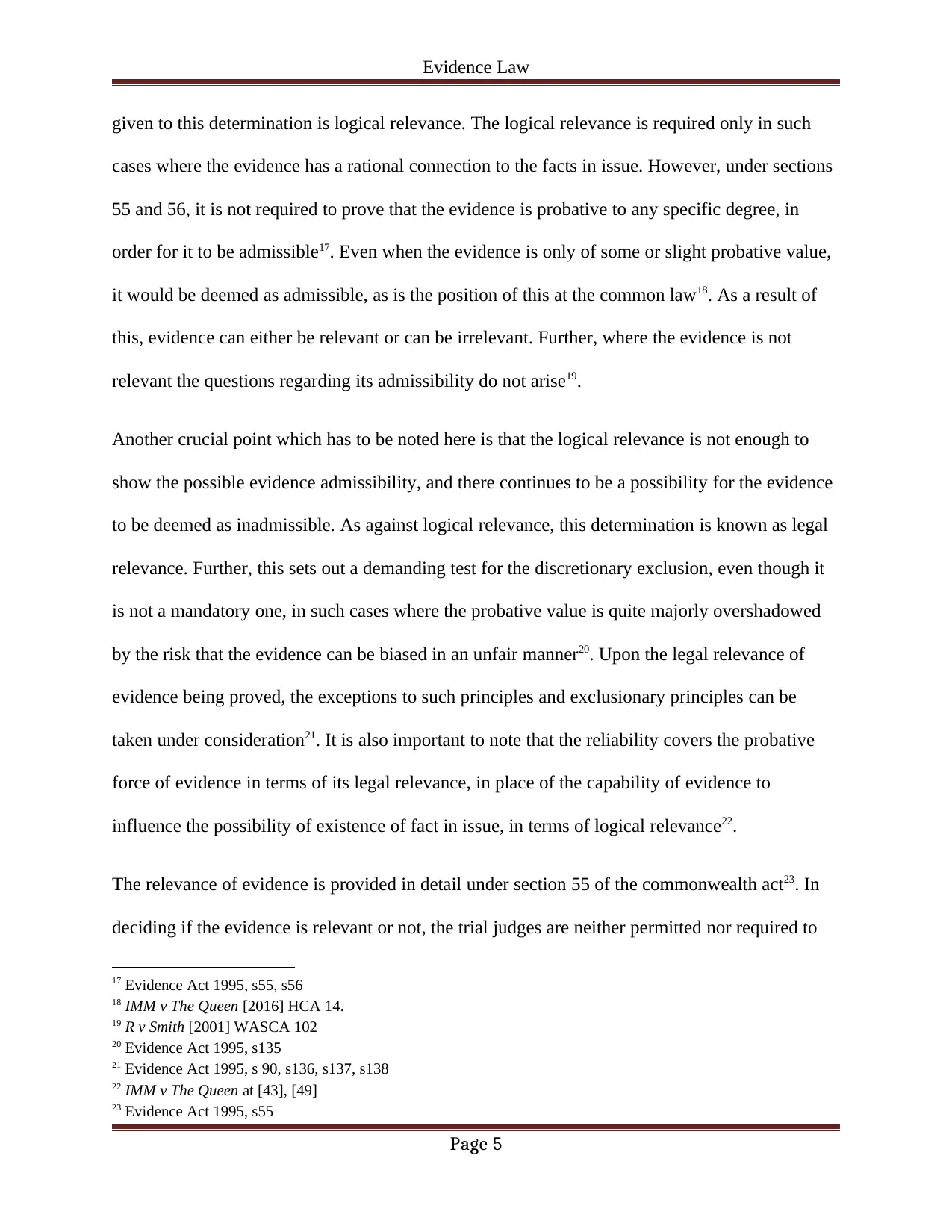
Evidence Law
given to this determination is logical relevance. The logical relevance is required only in such
cases where the evidence has a rational connection to the facts in issue. However, under sections
55 and 56, it is not required to prove that the evidence is probative to any specific degree, in
order for it to be admissible17. Even when the evidence is only of some or slight probative value,
it would be deemed as admissible, as is the position of this at the common law18. As a result of
this, evidence can either be relevant or can be irrelevant. Further, where the evidence is not
relevant the questions regarding its admissibility do not arise19.
Another crucial point which has to be noted here is that the logical relevance is not enough to
show the possible evidence admissibility, and there continues to be a possibility for the evidence
to be deemed as inadmissible. As against logical relevance, this determination is known as legal
relevance. Further, this sets out a demanding test for the discretionary exclusion, even though it
is not a mandatory one, in such cases where the probative value is quite majorly overshadowed
by the risk that the evidence can be biased in an unfair manner20. Upon the legal relevance of
evidence being proved, the exceptions to such principles and exclusionary principles can be
taken under consideration21. It is also important to note that the reliability covers the probative
force of evidence in terms of its legal relevance, in place of the capability of evidence to
influence the possibility of existence of fact in issue, in terms of logical relevance22.
The relevance of evidence is provided in detail under section 55 of the commonwealth act23. In
deciding if the evidence is relevant or not, the trial judges are neither permitted nor required to
17 Evidence Act 1995, s55, s56
18 IMM v The Queen [2016] HCA 14.
19 R v Smith [2001] WASCA 102
20 Evidence Act 1995, s135
21 Evidence Act 1995, s 90, s136, s137, s138
22 IMM v The Queen at [43], [49]
23 Evidence Act 1995, s55
Page 5
given to this determination is logical relevance. The logical relevance is required only in such
cases where the evidence has a rational connection to the facts in issue. However, under sections
55 and 56, it is not required to prove that the evidence is probative to any specific degree, in
order for it to be admissible17. Even when the evidence is only of some or slight probative value,
it would be deemed as admissible, as is the position of this at the common law18. As a result of
this, evidence can either be relevant or can be irrelevant. Further, where the evidence is not
relevant the questions regarding its admissibility do not arise19.
Another crucial point which has to be noted here is that the logical relevance is not enough to
show the possible evidence admissibility, and there continues to be a possibility for the evidence
to be deemed as inadmissible. As against logical relevance, this determination is known as legal
relevance. Further, this sets out a demanding test for the discretionary exclusion, even though it
is not a mandatory one, in such cases where the probative value is quite majorly overshadowed
by the risk that the evidence can be biased in an unfair manner20. Upon the legal relevance of
evidence being proved, the exceptions to such principles and exclusionary principles can be
taken under consideration21. It is also important to note that the reliability covers the probative
force of evidence in terms of its legal relevance, in place of the capability of evidence to
influence the possibility of existence of fact in issue, in terms of logical relevance22.
The relevance of evidence is provided in detail under section 55 of the commonwealth act23. In
deciding if the evidence is relevant or not, the trial judges are neither permitted nor required to
17 Evidence Act 1995, s55, s56
18 IMM v The Queen [2016] HCA 14.
19 R v Smith [2001] WASCA 102
20 Evidence Act 1995, s135
21 Evidence Act 1995, s 90, s136, s137, s138
22 IMM v The Queen at [43], [49]
23 Evidence Act 1995, s55
Page 5
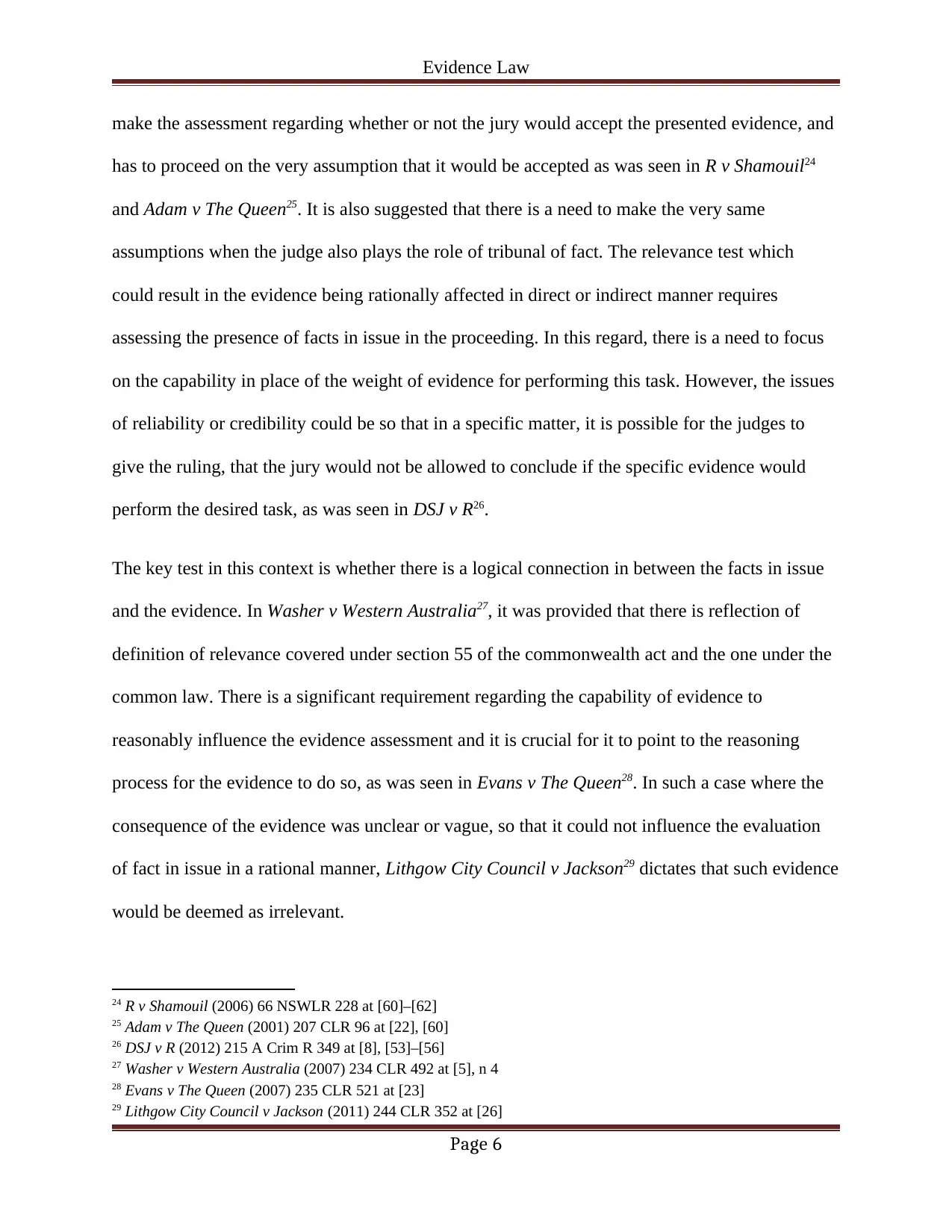
Evidence Law
make the assessment regarding whether or not the jury would accept the presented evidence, and
has to proceed on the very assumption that it would be accepted as was seen in R v Shamouil24
and Adam v The Queen25. It is also suggested that there is a need to make the very same
assumptions when the judge also plays the role of tribunal of fact. The relevance test which
could result in the evidence being rationally affected in direct or indirect manner requires
assessing the presence of facts in issue in the proceeding. In this regard, there is a need to focus
on the capability in place of the weight of evidence for performing this task. However, the issues
of reliability or credibility could be so that in a specific matter, it is possible for the judges to
give the ruling, that the jury would not be allowed to conclude if the specific evidence would
perform the desired task, as was seen in DSJ v R26.
The key test in this context is whether there is a logical connection in between the facts in issue
and the evidence. In Washer v Western Australia27, it was provided that there is reflection of
definition of relevance covered under section 55 of the commonwealth act and the one under the
common law. There is a significant requirement regarding the capability of evidence to
reasonably influence the evidence assessment and it is crucial for it to point to the reasoning
process for the evidence to do so, as was seen in Evans v The Queen28. In such a case where the
consequence of the evidence was unclear or vague, so that it could not influence the evaluation
of fact in issue in a rational manner, Lithgow City Council v Jackson29 dictates that such evidence
would be deemed as irrelevant.
24 R v Shamouil (2006) 66 NSWLR 228 at [60]–[62]
25 Adam v The Queen (2001) 207 CLR 96 at [22], [60]
26 DSJ v R (2012) 215 A Crim R 349 at [8], [53]–[56]
27 Washer v Western Australia (2007) 234 CLR 492 at [5], n 4
28 Evans v The Queen (2007) 235 CLR 521 at [23]
29 Lithgow City Council v Jackson (2011) 244 CLR 352 at [26]
Page 6
make the assessment regarding whether or not the jury would accept the presented evidence, and
has to proceed on the very assumption that it would be accepted as was seen in R v Shamouil24
and Adam v The Queen25. It is also suggested that there is a need to make the very same
assumptions when the judge also plays the role of tribunal of fact. The relevance test which
could result in the evidence being rationally affected in direct or indirect manner requires
assessing the presence of facts in issue in the proceeding. In this regard, there is a need to focus
on the capability in place of the weight of evidence for performing this task. However, the issues
of reliability or credibility could be so that in a specific matter, it is possible for the judges to
give the ruling, that the jury would not be allowed to conclude if the specific evidence would
perform the desired task, as was seen in DSJ v R26.
The key test in this context is whether there is a logical connection in between the facts in issue
and the evidence. In Washer v Western Australia27, it was provided that there is reflection of
definition of relevance covered under section 55 of the commonwealth act and the one under the
common law. There is a significant requirement regarding the capability of evidence to
reasonably influence the evidence assessment and it is crucial for it to point to the reasoning
process for the evidence to do so, as was seen in Evans v The Queen28. In such a case where the
consequence of the evidence was unclear or vague, so that it could not influence the evaluation
of fact in issue in a rational manner, Lithgow City Council v Jackson29 dictates that such evidence
would be deemed as irrelevant.
24 R v Shamouil (2006) 66 NSWLR 228 at [60]–[62]
25 Adam v The Queen (2001) 207 CLR 96 at [22], [60]
26 DSJ v R (2012) 215 A Crim R 349 at [8], [53]–[56]
27 Washer v Western Australia (2007) 234 CLR 492 at [5], n 4
28 Evans v The Queen (2007) 235 CLR 521 at [23]
29 Lithgow City Council v Jackson (2011) 244 CLR 352 at [26]
Page 6
⊘ This is a preview!⊘
Do you want full access?
Subscribe today to unlock all pages.

Trusted by 1+ million students worldwide
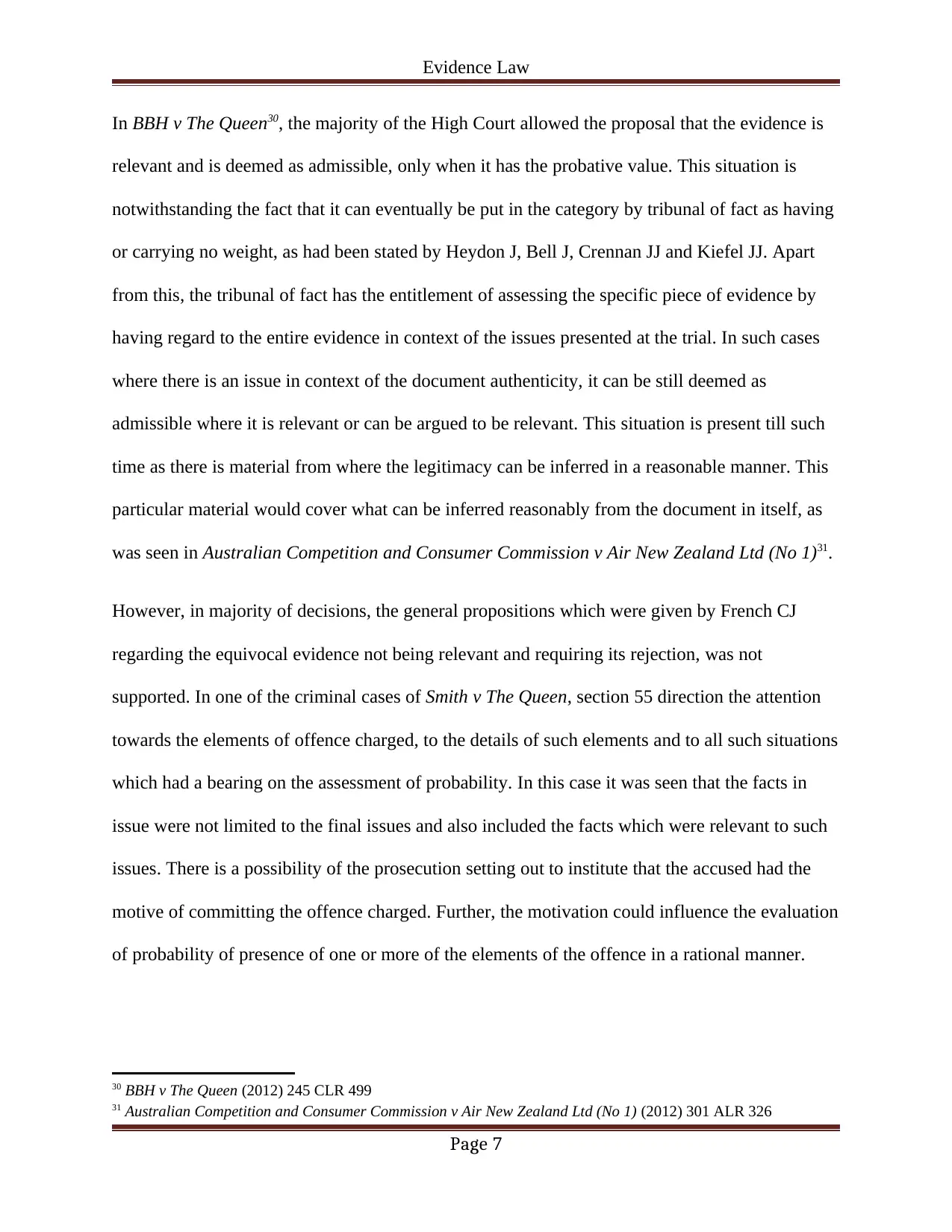
Evidence Law
In BBH v The Queen30, the majority of the High Court allowed the proposal that the evidence is
relevant and is deemed as admissible, only when it has the probative value. This situation is
notwithstanding the fact that it can eventually be put in the category by tribunal of fact as having
or carrying no weight, as had been stated by Heydon J, Bell J, Crennan JJ and Kiefel JJ. Apart
from this, the tribunal of fact has the entitlement of assessing the specific piece of evidence by
having regard to the entire evidence in context of the issues presented at the trial. In such cases
where there is an issue in context of the document authenticity, it can be still deemed as
admissible where it is relevant or can be argued to be relevant. This situation is present till such
time as there is material from where the legitimacy can be inferred in a reasonable manner. This
particular material would cover what can be inferred reasonably from the document in itself, as
was seen in Australian Competition and Consumer Commission v Air New Zealand Ltd (No 1)31.
However, in majority of decisions, the general propositions which were given by French CJ
regarding the equivocal evidence not being relevant and requiring its rejection, was not
supported. In one of the criminal cases of Smith v The Queen, section 55 direction the attention
towards the elements of offence charged, to the details of such elements and to all such situations
which had a bearing on the assessment of probability. In this case it was seen that the facts in
issue were not limited to the final issues and also included the facts which were relevant to such
issues. There is a possibility of the prosecution setting out to institute that the accused had the
motive of committing the offence charged. Further, the motivation could influence the evaluation
of probability of presence of one or more of the elements of the offence in a rational manner.
30 BBH v The Queen (2012) 245 CLR 499
31 Australian Competition and Consumer Commission v Air New Zealand Ltd (No 1) (2012) 301 ALR 326
Page 7
In BBH v The Queen30, the majority of the High Court allowed the proposal that the evidence is
relevant and is deemed as admissible, only when it has the probative value. This situation is
notwithstanding the fact that it can eventually be put in the category by tribunal of fact as having
or carrying no weight, as had been stated by Heydon J, Bell J, Crennan JJ and Kiefel JJ. Apart
from this, the tribunal of fact has the entitlement of assessing the specific piece of evidence by
having regard to the entire evidence in context of the issues presented at the trial. In such cases
where there is an issue in context of the document authenticity, it can be still deemed as
admissible where it is relevant or can be argued to be relevant. This situation is present till such
time as there is material from where the legitimacy can be inferred in a reasonable manner. This
particular material would cover what can be inferred reasonably from the document in itself, as
was seen in Australian Competition and Consumer Commission v Air New Zealand Ltd (No 1)31.
However, in majority of decisions, the general propositions which were given by French CJ
regarding the equivocal evidence not being relevant and requiring its rejection, was not
supported. In one of the criminal cases of Smith v The Queen, section 55 direction the attention
towards the elements of offence charged, to the details of such elements and to all such situations
which had a bearing on the assessment of probability. In this case it was seen that the facts in
issue were not limited to the final issues and also included the facts which were relevant to such
issues. There is a possibility of the prosecution setting out to institute that the accused had the
motive of committing the offence charged. Further, the motivation could influence the evaluation
of probability of presence of one or more of the elements of the offence in a rational manner.
30 BBH v The Queen (2012) 245 CLR 499
31 Australian Competition and Consumer Commission v Air New Zealand Ltd (No 1) (2012) 301 ALR 326
Page 7
Paraphrase This Document
Need a fresh take? Get an instant paraphrase of this document with our AI Paraphraser
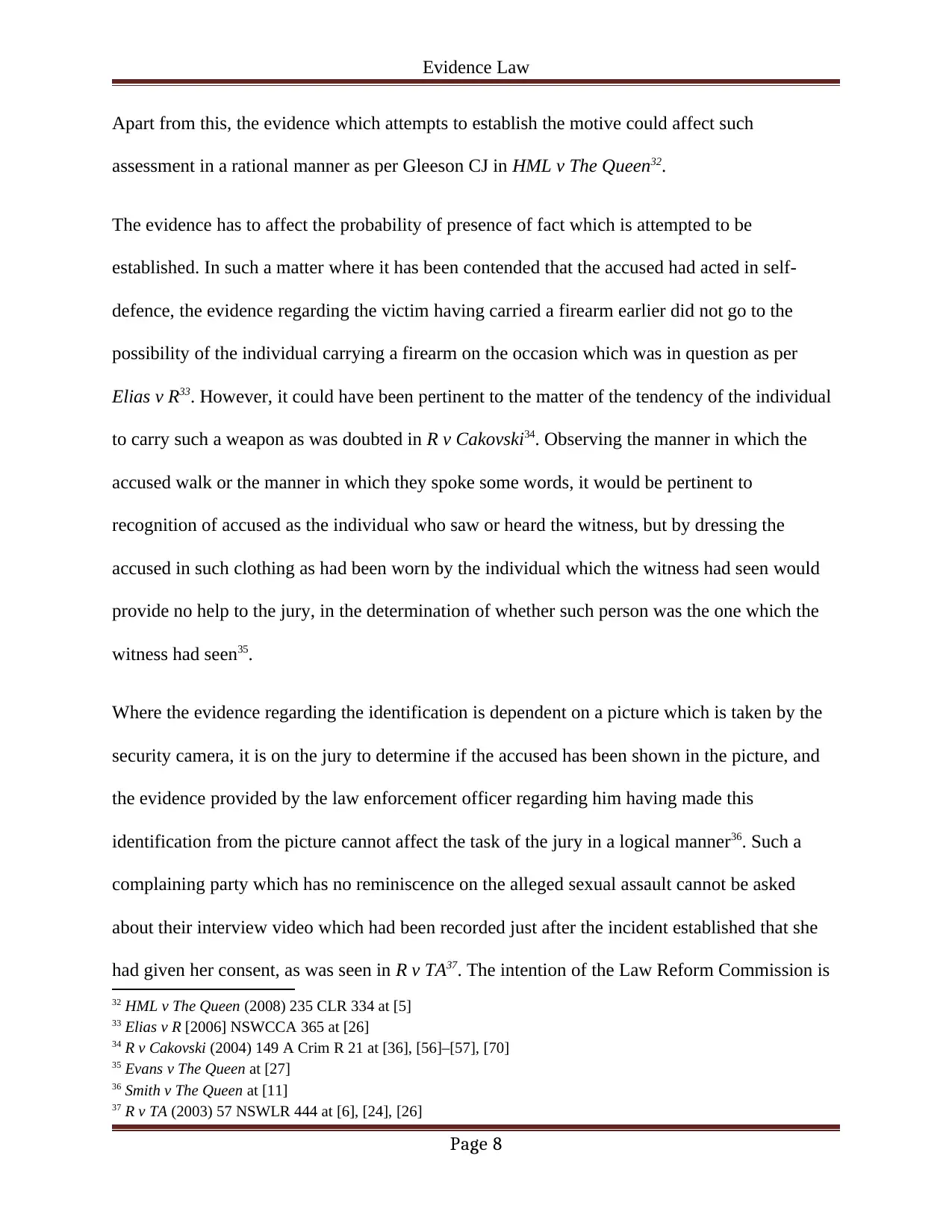
Evidence Law
Apart from this, the evidence which attempts to establish the motive could affect such
assessment in a rational manner as per Gleeson CJ in HML v The Queen32.
The evidence has to affect the probability of presence of fact which is attempted to be
established. In such a matter where it has been contended that the accused had acted in self-
defence, the evidence regarding the victim having carried a firearm earlier did not go to the
possibility of the individual carrying a firearm on the occasion which was in question as per
Elias v R33. However, it could have been pertinent to the matter of the tendency of the individual
to carry such a weapon as was doubted in R v Cakovski34. Observing the manner in which the
accused walk or the manner in which they spoke some words, it would be pertinent to
recognition of accused as the individual who saw or heard the witness, but by dressing the
accused in such clothing as had been worn by the individual which the witness had seen would
provide no help to the jury, in the determination of whether such person was the one which the
witness had seen35.
Where the evidence regarding the identification is dependent on a picture which is taken by the
security camera, it is on the jury to determine if the accused has been shown in the picture, and
the evidence provided by the law enforcement officer regarding him having made this
identification from the picture cannot affect the task of the jury in a logical manner36. Such a
complaining party which has no reminiscence on the alleged sexual assault cannot be asked
about their interview video which had been recorded just after the incident established that she
had given her consent, as was seen in R v TA37. The intention of the Law Reform Commission is
32 HML v The Queen (2008) 235 CLR 334 at [5]
33 Elias v R [2006] NSWCCA 365 at [26]
34 R v Cakovski (2004) 149 A Crim R 21 at [36], [56]–[57], [70]
35 Evans v The Queen at [27]
36 Smith v The Queen at [11]
37 R v TA (2003) 57 NSWLR 444 at [6], [24], [26]
Page 8
Apart from this, the evidence which attempts to establish the motive could affect such
assessment in a rational manner as per Gleeson CJ in HML v The Queen32.
The evidence has to affect the probability of presence of fact which is attempted to be
established. In such a matter where it has been contended that the accused had acted in self-
defence, the evidence regarding the victim having carried a firearm earlier did not go to the
possibility of the individual carrying a firearm on the occasion which was in question as per
Elias v R33. However, it could have been pertinent to the matter of the tendency of the individual
to carry such a weapon as was doubted in R v Cakovski34. Observing the manner in which the
accused walk or the manner in which they spoke some words, it would be pertinent to
recognition of accused as the individual who saw or heard the witness, but by dressing the
accused in such clothing as had been worn by the individual which the witness had seen would
provide no help to the jury, in the determination of whether such person was the one which the
witness had seen35.
Where the evidence regarding the identification is dependent on a picture which is taken by the
security camera, it is on the jury to determine if the accused has been shown in the picture, and
the evidence provided by the law enforcement officer regarding him having made this
identification from the picture cannot affect the task of the jury in a logical manner36. Such a
complaining party which has no reminiscence on the alleged sexual assault cannot be asked
about their interview video which had been recorded just after the incident established that she
had given her consent, as was seen in R v TA37. The intention of the Law Reform Commission is
32 HML v The Queen (2008) 235 CLR 334 at [5]
33 Elias v R [2006] NSWCCA 365 at [26]
34 R v Cakovski (2004) 149 A Crim R 21 at [36], [56]–[57], [70]
35 Evans v The Queen at [27]
36 Smith v The Queen at [11]
37 R v TA (2003) 57 NSWLR 444 at [6], [24], [26]
Page 8
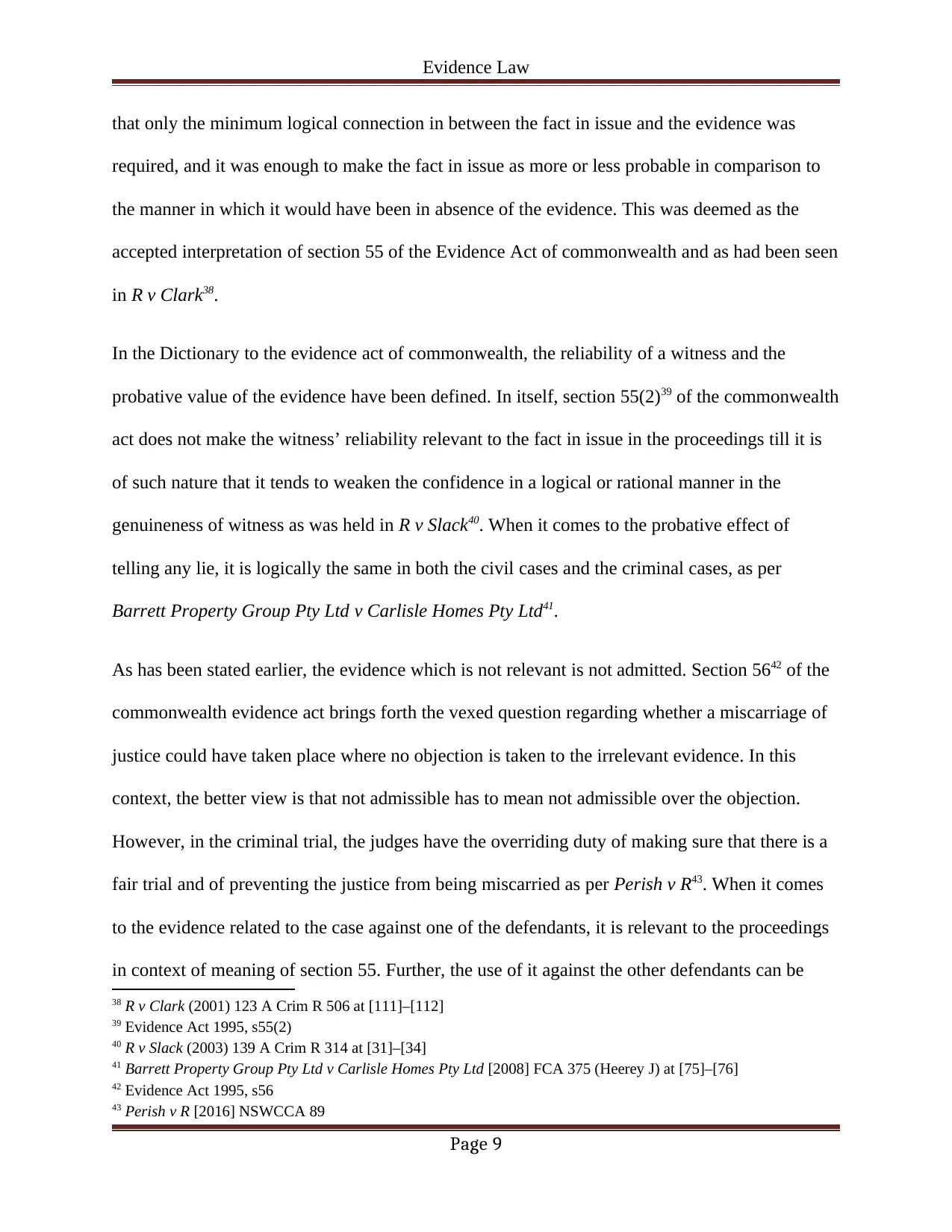
Evidence Law
that only the minimum logical connection in between the fact in issue and the evidence was
required, and it was enough to make the fact in issue as more or less probable in comparison to
the manner in which it would have been in absence of the evidence. This was deemed as the
accepted interpretation of section 55 of the Evidence Act of commonwealth and as had been seen
in R v Clark38.
In the Dictionary to the evidence act of commonwealth, the reliability of a witness and the
probative value of the evidence have been defined. In itself, section 55(2)39 of the commonwealth
act does not make the witness’ reliability relevant to the fact in issue in the proceedings till it is
of such nature that it tends to weaken the confidence in a logical or rational manner in the
genuineness of witness as was held in R v Slack40. When it comes to the probative effect of
telling any lie, it is logically the same in both the civil cases and the criminal cases, as per
Barrett Property Group Pty Ltd v Carlisle Homes Pty Ltd41.
As has been stated earlier, the evidence which is not relevant is not admitted. Section 5642 of the
commonwealth evidence act brings forth the vexed question regarding whether a miscarriage of
justice could have taken place where no objection is taken to the irrelevant evidence. In this
context, the better view is that not admissible has to mean not admissible over the objection.
However, in the criminal trial, the judges have the overriding duty of making sure that there is a
fair trial and of preventing the justice from being miscarried as per Perish v R43. When it comes
to the evidence related to the case against one of the defendants, it is relevant to the proceedings
in context of meaning of section 55. Further, the use of it against the other defendants can be
38 R v Clark (2001) 123 A Crim R 506 at [111]–[112]
39 Evidence Act 1995, s55(2)
40 R v Slack (2003) 139 A Crim R 314 at [31]–[34]
41 Barrett Property Group Pty Ltd v Carlisle Homes Pty Ltd [2008] FCA 375 (Heerey J) at [75]–[76]
42 Evidence Act 1995, s56
43 Perish v R [2016] NSWCCA 89
Page 9
that only the minimum logical connection in between the fact in issue and the evidence was
required, and it was enough to make the fact in issue as more or less probable in comparison to
the manner in which it would have been in absence of the evidence. This was deemed as the
accepted interpretation of section 55 of the Evidence Act of commonwealth and as had been seen
in R v Clark38.
In the Dictionary to the evidence act of commonwealth, the reliability of a witness and the
probative value of the evidence have been defined. In itself, section 55(2)39 of the commonwealth
act does not make the witness’ reliability relevant to the fact in issue in the proceedings till it is
of such nature that it tends to weaken the confidence in a logical or rational manner in the
genuineness of witness as was held in R v Slack40. When it comes to the probative effect of
telling any lie, it is logically the same in both the civil cases and the criminal cases, as per
Barrett Property Group Pty Ltd v Carlisle Homes Pty Ltd41.
As has been stated earlier, the evidence which is not relevant is not admitted. Section 5642 of the
commonwealth evidence act brings forth the vexed question regarding whether a miscarriage of
justice could have taken place where no objection is taken to the irrelevant evidence. In this
context, the better view is that not admissible has to mean not admissible over the objection.
However, in the criminal trial, the judges have the overriding duty of making sure that there is a
fair trial and of preventing the justice from being miscarried as per Perish v R43. When it comes
to the evidence related to the case against one of the defendants, it is relevant to the proceedings
in context of meaning of section 55. Further, the use of it against the other defendants can be
38 R v Clark (2001) 123 A Crim R 506 at [111]–[112]
39 Evidence Act 1995, s55(2)
40 R v Slack (2003) 139 A Crim R 314 at [31]–[34]
41 Barrett Property Group Pty Ltd v Carlisle Homes Pty Ltd [2008] FCA 375 (Heerey J) at [75]–[76]
42 Evidence Act 1995, s56
43 Perish v R [2016] NSWCCA 89
Page 9
⊘ This is a preview!⊘
Do you want full access?
Subscribe today to unlock all pages.

Trusted by 1+ million students worldwide
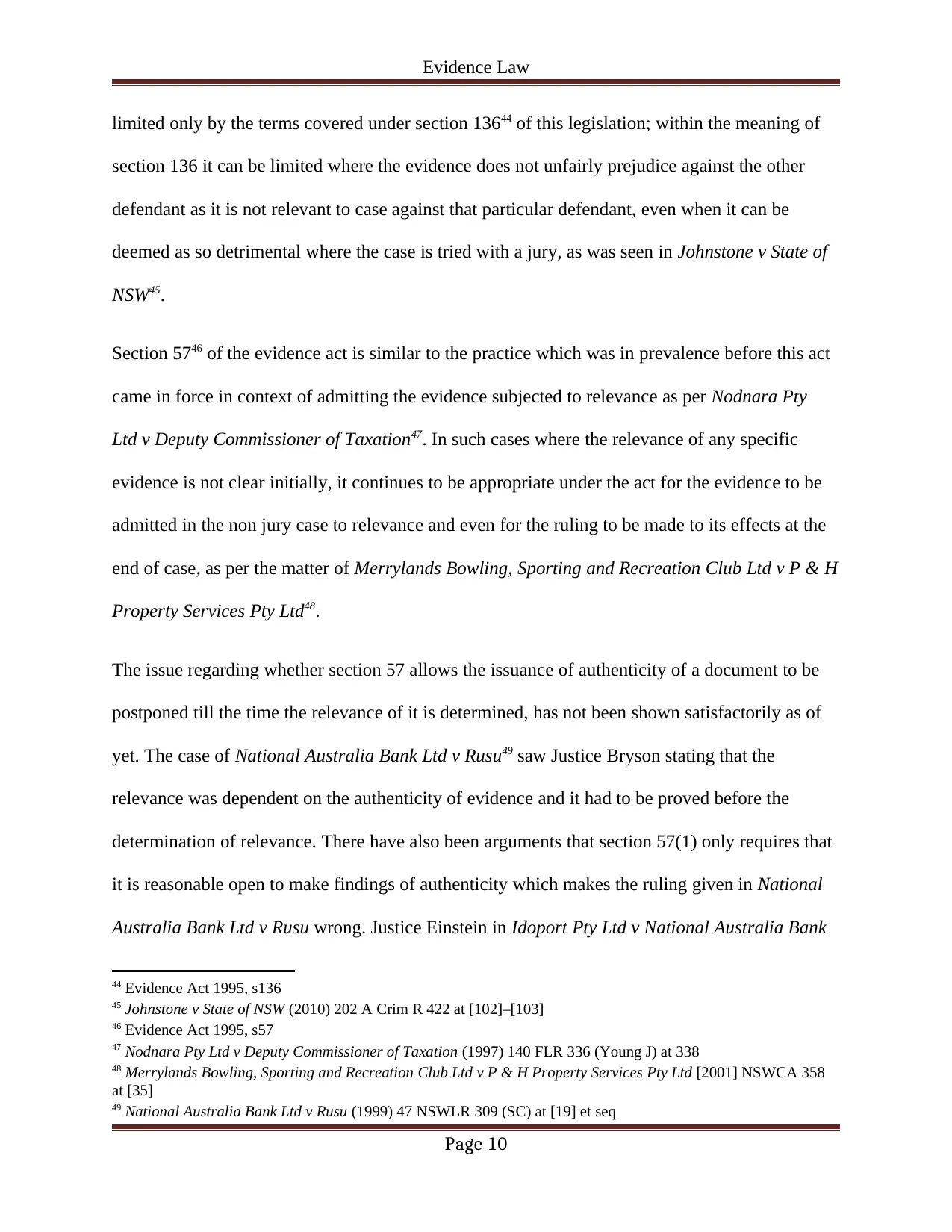
Evidence Law
limited only by the terms covered under section 13644 of this legislation; within the meaning of
section 136 it can be limited where the evidence does not unfairly prejudice against the other
defendant as it is not relevant to case against that particular defendant, even when it can be
deemed as so detrimental where the case is tried with a jury, as was seen in Johnstone v State of
NSW45.
Section 5746 of the evidence act is similar to the practice which was in prevalence before this act
came in force in context of admitting the evidence subjected to relevance as per Nodnara Pty
Ltd v Deputy Commissioner of Taxation47. In such cases where the relevance of any specific
evidence is not clear initially, it continues to be appropriate under the act for the evidence to be
admitted in the non jury case to relevance and even for the ruling to be made to its effects at the
end of case, as per the matter of Merrylands Bowling, Sporting and Recreation Club Ltd v P & H
Property Services Pty Ltd48.
The issue regarding whether section 57 allows the issuance of authenticity of a document to be
postponed till the time the relevance of it is determined, has not been shown satisfactorily as of
yet. The case of National Australia Bank Ltd v Rusu49 saw Justice Bryson stating that the
relevance was dependent on the authenticity of evidence and it had to be proved before the
determination of relevance. There have also been arguments that section 57(1) only requires that
it is reasonable open to make findings of authenticity which makes the ruling given in National
Australia Bank Ltd v Rusu wrong. Justice Einstein in Idoport Pty Ltd v National Australia Bank
44 Evidence Act 1995, s136
45 Johnstone v State of NSW (2010) 202 A Crim R 422 at [102]–[103]
46 Evidence Act 1995, s57
47 Nodnara Pty Ltd v Deputy Commissioner of Taxation (1997) 140 FLR 336 (Young J) at 338
48 Merrylands Bowling, Sporting and Recreation Club Ltd v P & H Property Services Pty Ltd [2001] NSWCA 358
at [35]
49 National Australia Bank Ltd v Rusu (1999) 47 NSWLR 309 (SC) at [19] et seq
Page 10
limited only by the terms covered under section 13644 of this legislation; within the meaning of
section 136 it can be limited where the evidence does not unfairly prejudice against the other
defendant as it is not relevant to case against that particular defendant, even when it can be
deemed as so detrimental where the case is tried with a jury, as was seen in Johnstone v State of
NSW45.
Section 5746 of the evidence act is similar to the practice which was in prevalence before this act
came in force in context of admitting the evidence subjected to relevance as per Nodnara Pty
Ltd v Deputy Commissioner of Taxation47. In such cases where the relevance of any specific
evidence is not clear initially, it continues to be appropriate under the act for the evidence to be
admitted in the non jury case to relevance and even for the ruling to be made to its effects at the
end of case, as per the matter of Merrylands Bowling, Sporting and Recreation Club Ltd v P & H
Property Services Pty Ltd48.
The issue regarding whether section 57 allows the issuance of authenticity of a document to be
postponed till the time the relevance of it is determined, has not been shown satisfactorily as of
yet. The case of National Australia Bank Ltd v Rusu49 saw Justice Bryson stating that the
relevance was dependent on the authenticity of evidence and it had to be proved before the
determination of relevance. There have also been arguments that section 57(1) only requires that
it is reasonable open to make findings of authenticity which makes the ruling given in National
Australia Bank Ltd v Rusu wrong. Justice Einstein in Idoport Pty Ltd v National Australia Bank
44 Evidence Act 1995, s136
45 Johnstone v State of NSW (2010) 202 A Crim R 422 at [102]–[103]
46 Evidence Act 1995, s57
47 Nodnara Pty Ltd v Deputy Commissioner of Taxation (1997) 140 FLR 336 (Young J) at 338
48 Merrylands Bowling, Sporting and Recreation Club Ltd v P & H Property Services Pty Ltd [2001] NSWCA 358
at [35]
49 National Australia Bank Ltd v Rusu (1999) 47 NSWLR 309 (SC) at [19] et seq
Page 10
Paraphrase This Document
Need a fresh take? Get an instant paraphrase of this document with our AI Paraphraser
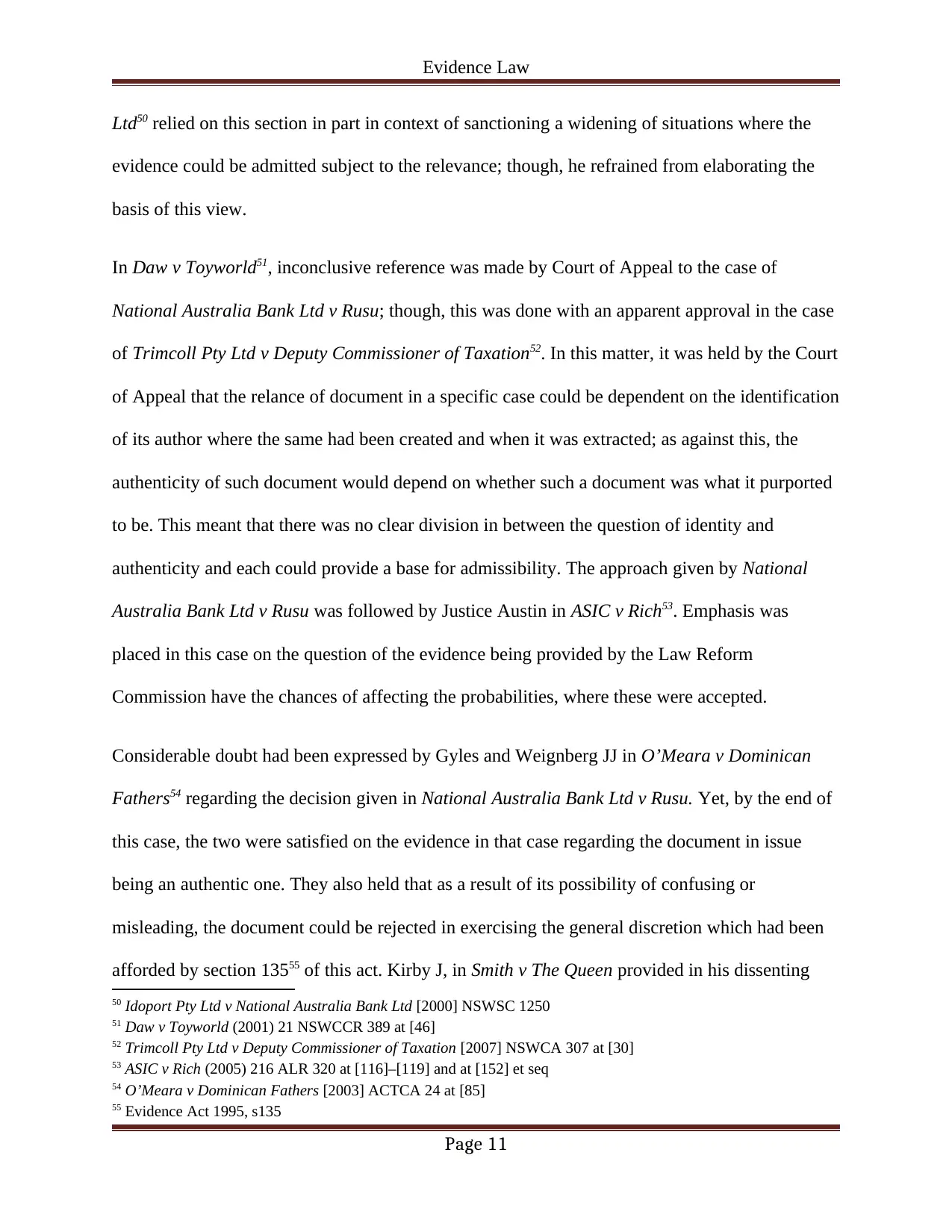
Evidence Law
Ltd50 relied on this section in part in context of sanctioning a widening of situations where the
evidence could be admitted subject to the relevance; though, he refrained from elaborating the
basis of this view.
In Daw v Toyworld51, inconclusive reference was made by Court of Appeal to the case of
National Australia Bank Ltd v Rusu; though, this was done with an apparent approval in the case
of Trimcoll Pty Ltd v Deputy Commissioner of Taxation52. In this matter, it was held by the Court
of Appeal that the relance of document in a specific case could be dependent on the identification
of its author where the same had been created and when it was extracted; as against this, the
authenticity of such document would depend on whether such a document was what it purported
to be. This meant that there was no clear division in between the question of identity and
authenticity and each could provide a base for admissibility. The approach given by National
Australia Bank Ltd v Rusu was followed by Justice Austin in ASIC v Rich53. Emphasis was
placed in this case on the question of the evidence being provided by the Law Reform
Commission have the chances of affecting the probabilities, where these were accepted.
Considerable doubt had been expressed by Gyles and Weignberg JJ in O’Meara v Dominican
Fathers54 regarding the decision given in National Australia Bank Ltd v Rusu. Yet, by the end of
this case, the two were satisfied on the evidence in that case regarding the document in issue
being an authentic one. They also held that as a result of its possibility of confusing or
misleading, the document could be rejected in exercising the general discretion which had been
afforded by section 13555 of this act. Kirby J, in Smith v The Queen provided in his dissenting
50 Idoport Pty Ltd v National Australia Bank Ltd [2000] NSWSC 1250
51 Daw v Toyworld (2001) 21 NSWCCR 389 at [46]
52 Trimcoll Pty Ltd v Deputy Commissioner of Taxation [2007] NSWCA 307 at [30]
53 ASIC v Rich (2005) 216 ALR 320 at [116]–[119] and at [152] et seq
54 O’Meara v Dominican Fathers [2003] ACTCA 24 at [85]
55 Evidence Act 1995, s135
Page 11
Ltd50 relied on this section in part in context of sanctioning a widening of situations where the
evidence could be admitted subject to the relevance; though, he refrained from elaborating the
basis of this view.
In Daw v Toyworld51, inconclusive reference was made by Court of Appeal to the case of
National Australia Bank Ltd v Rusu; though, this was done with an apparent approval in the case
of Trimcoll Pty Ltd v Deputy Commissioner of Taxation52. In this matter, it was held by the Court
of Appeal that the relance of document in a specific case could be dependent on the identification
of its author where the same had been created and when it was extracted; as against this, the
authenticity of such document would depend on whether such a document was what it purported
to be. This meant that there was no clear division in between the question of identity and
authenticity and each could provide a base for admissibility. The approach given by National
Australia Bank Ltd v Rusu was followed by Justice Austin in ASIC v Rich53. Emphasis was
placed in this case on the question of the evidence being provided by the Law Reform
Commission have the chances of affecting the probabilities, where these were accepted.
Considerable doubt had been expressed by Gyles and Weignberg JJ in O’Meara v Dominican
Fathers54 regarding the decision given in National Australia Bank Ltd v Rusu. Yet, by the end of
this case, the two were satisfied on the evidence in that case regarding the document in issue
being an authentic one. They also held that as a result of its possibility of confusing or
misleading, the document could be rejected in exercising the general discretion which had been
afforded by section 13555 of this act. Kirby J, in Smith v The Queen provided in his dissenting
50 Idoport Pty Ltd v National Australia Bank Ltd [2000] NSWSC 1250
51 Daw v Toyworld (2001) 21 NSWCCR 389 at [46]
52 Trimcoll Pty Ltd v Deputy Commissioner of Taxation [2007] NSWCA 307 at [30]
53 ASIC v Rich (2005) 216 ALR 320 at [116]–[119] and at [152] et seq
54 O’Meara v Dominican Fathers [2003] ACTCA 24 at [85]
55 Evidence Act 1995, s135
Page 11
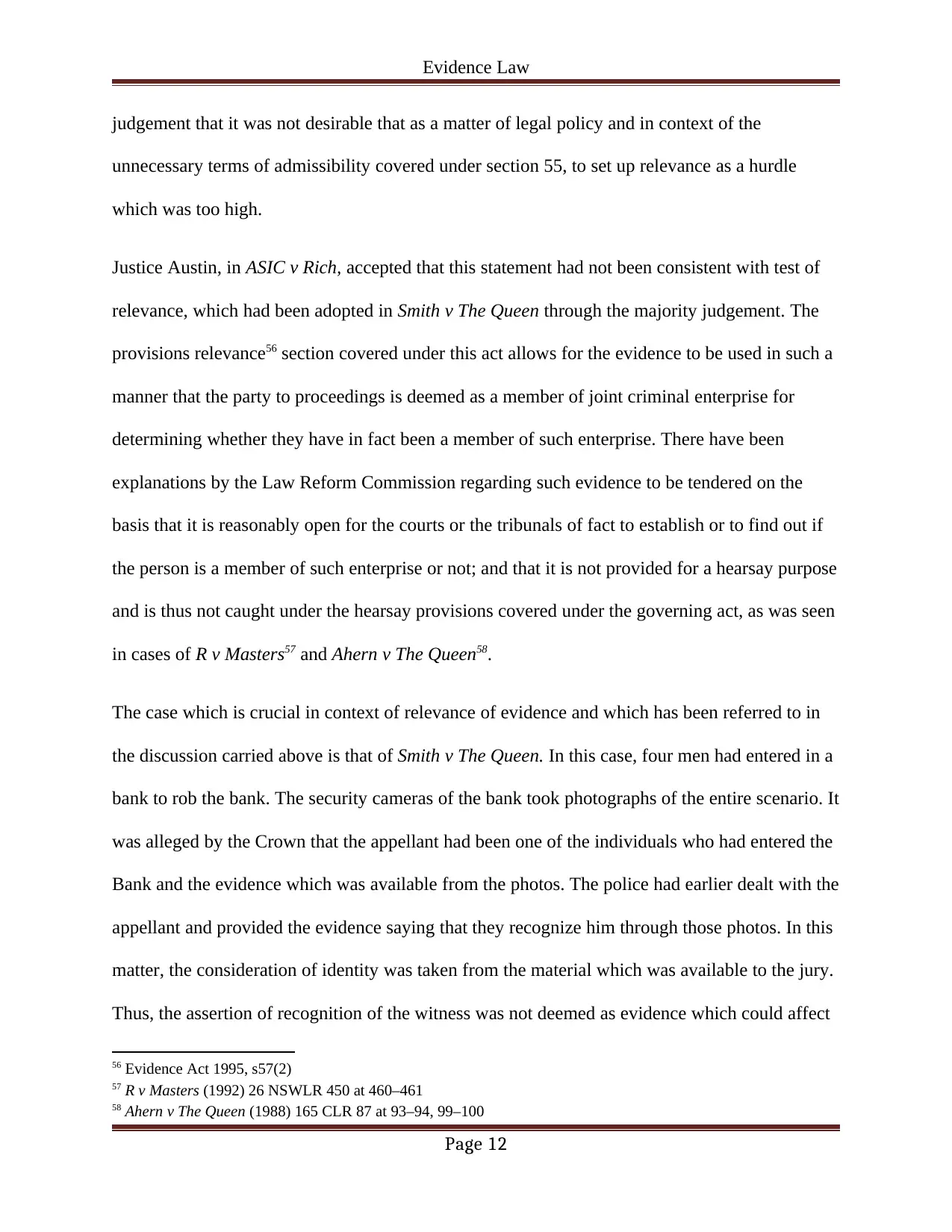
Evidence Law
judgement that it was not desirable that as a matter of legal policy and in context of the
unnecessary terms of admissibility covered under section 55, to set up relevance as a hurdle
which was too high.
Justice Austin, in ASIC v Rich, accepted that this statement had not been consistent with test of
relevance, which had been adopted in Smith v The Queen through the majority judgement. The
provisions relevance56 section covered under this act allows for the evidence to be used in such a
manner that the party to proceedings is deemed as a member of joint criminal enterprise for
determining whether they have in fact been a member of such enterprise. There have been
explanations by the Law Reform Commission regarding such evidence to be tendered on the
basis that it is reasonably open for the courts or the tribunals of fact to establish or to find out if
the person is a member of such enterprise or not; and that it is not provided for a hearsay purpose
and is thus not caught under the hearsay provisions covered under the governing act, as was seen
in cases of R v Masters57 and Ahern v The Queen58.
The case which is crucial in context of relevance of evidence and which has been referred to in
the discussion carried above is that of Smith v The Queen. In this case, four men had entered in a
bank to rob the bank. The security cameras of the bank took photographs of the entire scenario. It
was alleged by the Crown that the appellant had been one of the individuals who had entered the
Bank and the evidence which was available from the photos. The police had earlier dealt with the
appellant and provided the evidence saying that they recognize him through those photos. In this
matter, the consideration of identity was taken from the material which was available to the jury.
Thus, the assertion of recognition of the witness was not deemed as evidence which could affect
56 Evidence Act 1995, s57(2)
57 R v Masters (1992) 26 NSWLR 450 at 460–461
58 Ahern v The Queen (1988) 165 CLR 87 at 93–94, 99–100
Page 12
judgement that it was not desirable that as a matter of legal policy and in context of the
unnecessary terms of admissibility covered under section 55, to set up relevance as a hurdle
which was too high.
Justice Austin, in ASIC v Rich, accepted that this statement had not been consistent with test of
relevance, which had been adopted in Smith v The Queen through the majority judgement. The
provisions relevance56 section covered under this act allows for the evidence to be used in such a
manner that the party to proceedings is deemed as a member of joint criminal enterprise for
determining whether they have in fact been a member of such enterprise. There have been
explanations by the Law Reform Commission regarding such evidence to be tendered on the
basis that it is reasonably open for the courts or the tribunals of fact to establish or to find out if
the person is a member of such enterprise or not; and that it is not provided for a hearsay purpose
and is thus not caught under the hearsay provisions covered under the governing act, as was seen
in cases of R v Masters57 and Ahern v The Queen58.
The case which is crucial in context of relevance of evidence and which has been referred to in
the discussion carried above is that of Smith v The Queen. In this case, four men had entered in a
bank to rob the bank. The security cameras of the bank took photographs of the entire scenario. It
was alleged by the Crown that the appellant had been one of the individuals who had entered the
Bank and the evidence which was available from the photos. The police had earlier dealt with the
appellant and provided the evidence saying that they recognize him through those photos. In this
matter, the consideration of identity was taken from the material which was available to the jury.
Thus, the assertion of recognition of the witness was not deemed as evidence which could affect
56 Evidence Act 1995, s57(2)
57 R v Masters (1992) 26 NSWLR 450 at 460–461
58 Ahern v The Queen (1988) 165 CLR 87 at 93–94, 99–100
Page 12
⊘ This is a preview!⊘
Do you want full access?
Subscribe today to unlock all pages.

Trusted by 1+ million students worldwide
1 out of 18
Your All-in-One AI-Powered Toolkit for Academic Success.
+13062052269
info@desklib.com
Available 24*7 on WhatsApp / Email
![[object Object]](/_next/static/media/star-bottom.7253800d.svg)
Unlock your academic potential
Copyright © 2020–2026 A2Z Services. All Rights Reserved. Developed and managed by ZUCOL.
